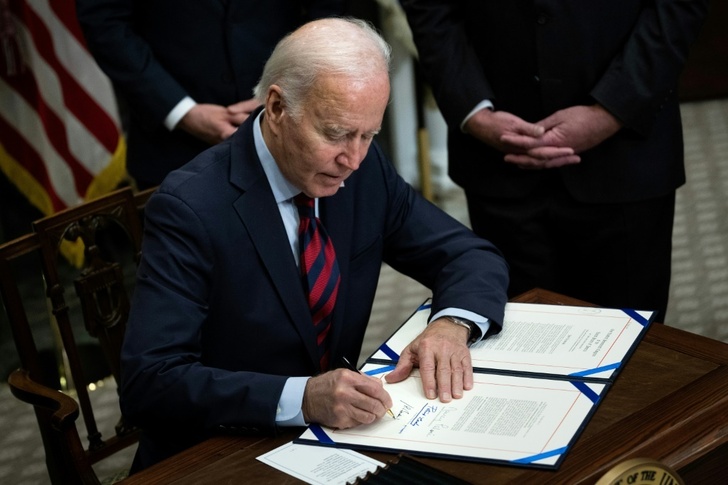US President Joe Biden signed into law Friday a rare intervention by Congress forcing freight rail unions to accept a salary deal, avoiding a possibly devastating strike -- but putting the pro-union Democrat in an awkward political position.
Biden signed the law in a brief White House ceremony only a week before unions who had rejected the deal were expected to have gone on strike, threatening crucial supply chains across the world's biggest economy.
The deal delivers a hefty wage increase but four of the 12 unions involved refused to accept it because there was no agreement on giving workers paid sick leave. Congress acted under a little used power to resolve disputes involving railroads.
As he signed the bill, Biden said Congress had "avoided what, without a doubt, would have been an economic catastrophe."
"Without freight rail, many of the US industries would literally have shut down," Biden said, adding that his advisors feared the loss of three quarters of a million jobs within two weeks if the strike had gone ahead.
The episode was awkward politically for Biden.
Trade unions constitute a major element in his electoral coalition and he frequently describes himself as a lifelong union supporter and the "most pro-union president" in history.
That brand has taken a hit from the emergency bill signing, with some on the left accusing Biden of having sold out. After the Senate came down decisively in favor of the rail management, one union leader called the situation "horrific."
The Brotherhood of Railroad Signalmen alleged that Senators had "demonstrated they are for the corporate class."
The issue could come up Friday when Biden does voter outreach during a visit to the International Brotherhood of Electrical Workers (IBEW) union in Boston.
- No choice -
Judging by the overwhelmingly bipartisan support in Congress for forcing through the deal, the political hit for Biden will be contained. The House easily passed the bill and on Thursday the Senate, where usually Biden's bills are lucky to scrape through with the one-vote Democratic majority, passed 80-15.
Biden said he had no choice but to act quickly in the face of what the White House warns would have been a crippling strike right when the US economy is showing signs of stabilizing in the wake of the Covid pandemic.
In his comments at the signing ceremony, Biden said the wages deal -- which his administration was heavily involved in crafting -- was "a good product."
He acknowledged the lack of sick leave but said "I'm coming back at it" with "more work to do."
Above all, Biden said, the forceful intervention by Congress and the White House would benefit the country as a whole.
"They did one heck of a job in averting what could have been a real disaster," he said.
Biden said "765,000 Americans, many of them union members themselves, would have been put out of work within the first two weeks of this strike alone."
In addition, the breaking of supply chains for basic materials like chemicals and farm supplies would put clean drinking water and food at risk.
"We’ve spared the country that catastrophe," Biden said.
sms/md
© Agence France-Presse
Your content is great. However, if any of the content contained herein violates any rights of yours, including those of copyright, please contact us immediately by e-mail at media[@]kissrpr.com.
Source: Story.KISSPR.com

